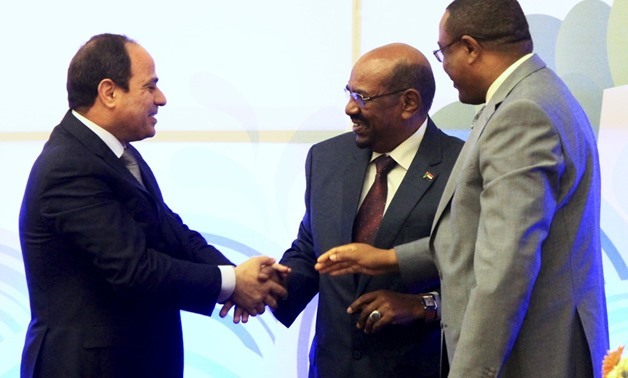
Egypt’s President Abdel Fatah al-Sisi (L), with his Sudanese counterpart, Omar Hassan al-Bashir (C), and former Ethiopian Prime Minister Hailemariam Desalegn - Reuters/Mohamed Nureldin Abdallah
CAIRO – 3 May 2018: Egypt, Sudan and Ethiopia are expected to commence a new round of negotiations on Friday to settle the lengthy dispute over the Grand Ethiopian Renaissance Dam (GERD).
The upcoming meeting in the Ethiopian capital of Addis Ababa will include the three states’ irrigation ministers. The meeting is hailed as a technical gathering that precedes another tripartite meeting on the political level on May 14.
The last tripartite meeting in Khartoum on April 6 ended with a deadlock when Egyptian Foreign Minister Sameh Shoukry announced that no resolution was reached, as Ethiopian officials insist that the dam will not harm any of the Nile’s downstream countries, namely Egypt and Sudan.
Egypt fears a likely negative impact on its annual share of Nile water, the country’s main source of water. Despite the long discussions, the matter remains locked in a stalemate.
The current odds are stacked against a smooth round of talks, as Ethiopia is witnessing a dire turmoil that led to the resignation of former Prime Minister Hailemariam Desalegn on February 15.
Meanwhile, in Sudan, Foreign Minister Ibrahim Ghandour was sacked by a presidential decree on April 19.
However, Egyptian officials can pin their hopes for accelerating the talks on current Ethiopian Prime Minister Abiy Ahmed, the first Oromo member to assume the office. The Oromo ethnic group has suffered from a long repression imposed by the traditional rulers of the African Horn state, who are mainly members of the Amhara and Tigray ethnic groups.
Unfortunately, the young, 41-year-old Ethiopian prime minister is busy solving the current unrest in Ethiopia, so his foreign policy has not been unveiled yet.
The Ethiopian prime minister is facing a growing dispute within the state’s regions. Nonetheless, he vowed to improve his country’s relations with other African neighbors. Ahmed has so far visited the neighboring state of Djibouti and is currently visiting Sudan.
The promising young leader was an active member of the opposition movement in Ethiopia and is known for his flexibility and understanding.
On the other side, Egyptian officials have shown flexibility when they assented to the building of the dam in 2015; however, Egypt’s growing scarcity of water remains a constant alarm.
Ethiopia started to build GERD in 2011 without consulting Egypt, and the move led to a long diplomatic spat between both states. The African Horn state is in desperate need of the dam, as it suffers from staggering daily power outages.
Technical officials in the three countries opted to hire two French consultancy companies – BRL and Artelia – in September 2016. However, the negotiations were brought to a halt in November 2017 as Ethiopia and Sudan objected the companies’ preliminary report on the environmental impact of GERD.
In December 2017, Egypt demanded the intervention of the World Bank in the matter, a move that was rejected by Ethiopia.
Ethiopia seeks to start filling GERD’s reservoir during the upcoming Nile flood season in July.

Comments
Leave a Comment